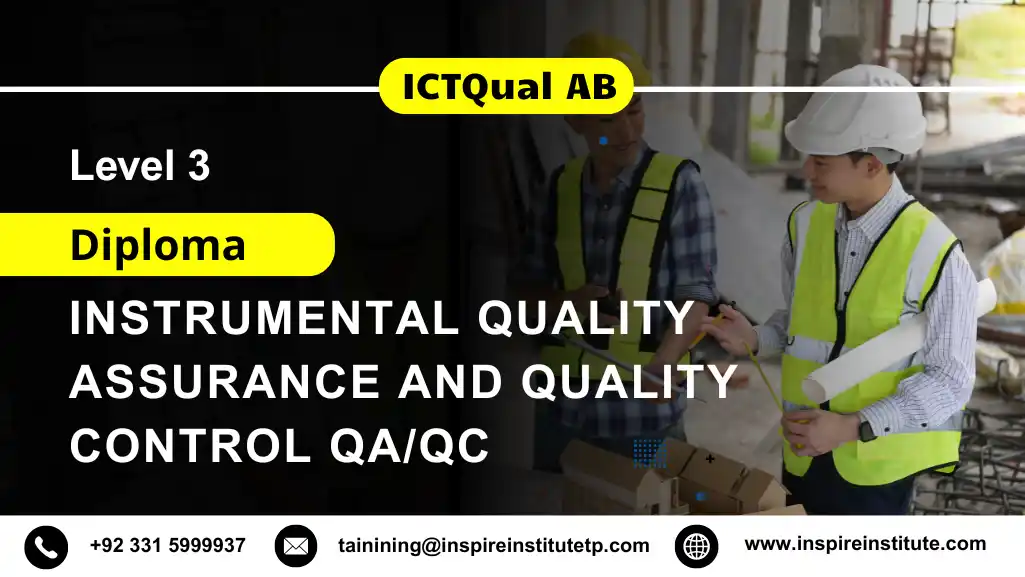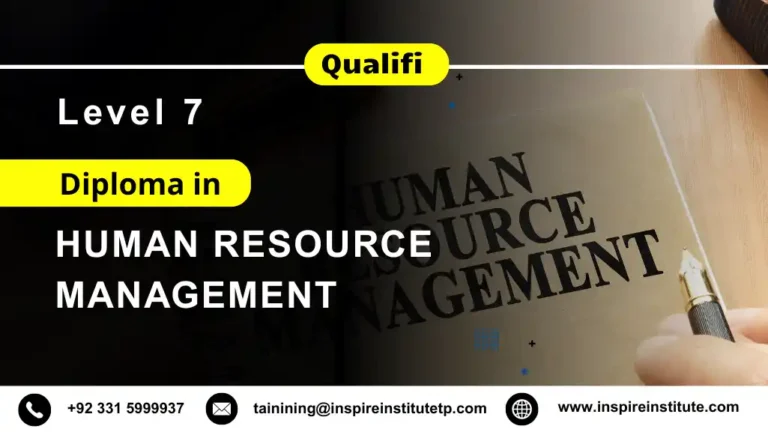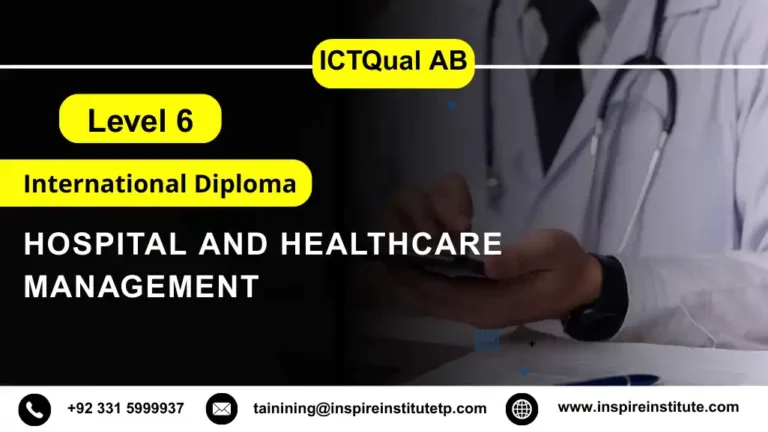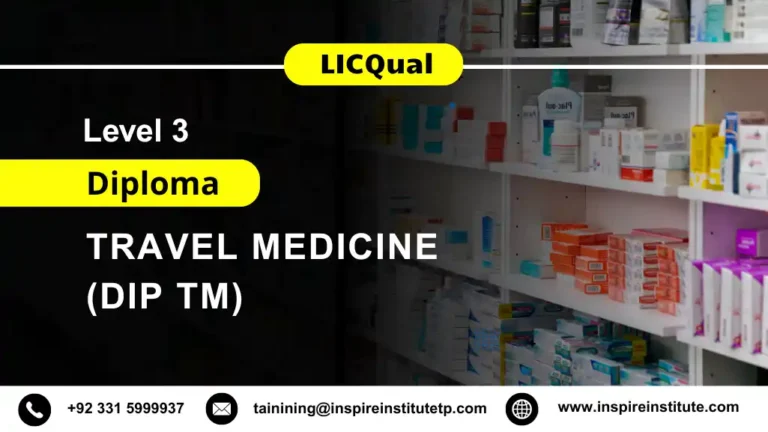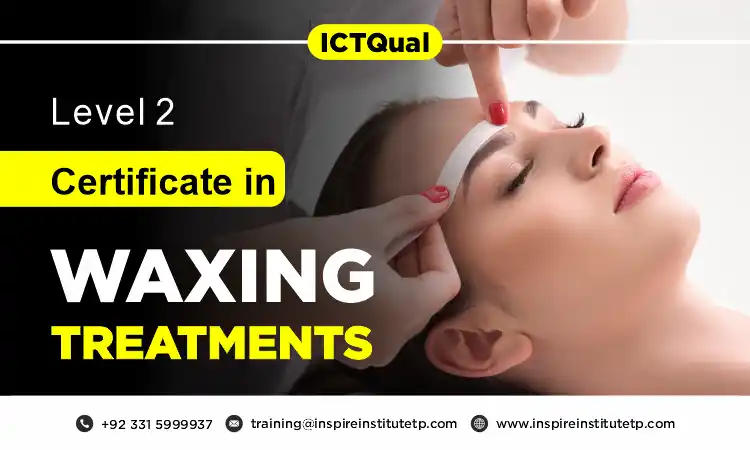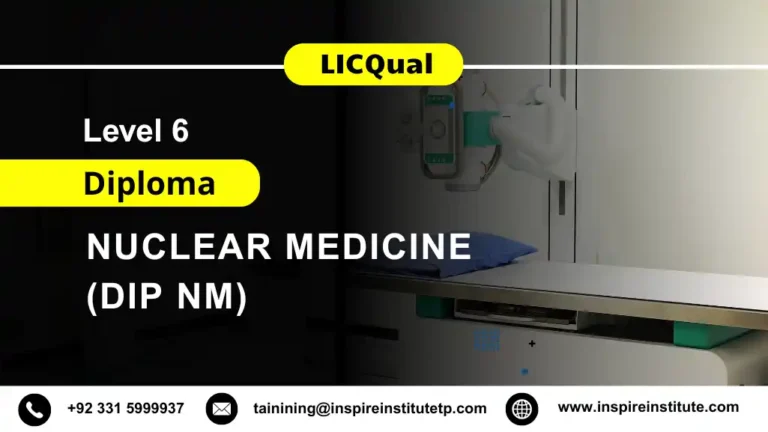ICTQual AB Level 3 Diploma in Instrumental Quality Assurance and Quality Control QA/QC
The ICTQual AB Level 3 Diploma in Instrumental Quality Assurance and Quality Control (QA/QC) is a globally recognized qualification designed for individuals seeking to build a solid foundation in quality control and assurance practices within industrial, engineering, and technical environments. As industries across the world continue to demand precision, safety, and efficiency, the need for skilled QA/QC professionals has become increasingly vital. This course Quality Assurance provides a pathway to develop expertise in instrumental techniques, measurement systems, inspection processes, and documentation standards essential to maintaining and improving quality in modern industries.
The purpose of the ICTQual AB Level 3 Diploma in Instrumental QA/QC is to equip learners with the knowledge and competence required to ensure that products, systems, and processes meet defined quality standards. It offers a Quality Assurance comprehensive understanding of instrumental methods used in quality testing, calibration, and inspection — aligning learners with international best practices. By mastering these methods, professionals can effectively contribute to quality improvement, safety compliance, and operational excellence within their organizations.
Through this program, learners will gain in-depth insight into instrumental quality assurance and quality control concepts, including process monitoring, inspection techniques, and documentation management. The course also focuses on the use of modern instruments and tools for precision testing, enabling participants to develop hands-on skills that are directly applicable in real-world quality operations. These skills are essential for individuals aspiring to work in manufacturing, construction, oil and gas, and other technical sectors.
Why Choose this Qualification
The ICTQual AB Level 3 Diploma in Instrumental Quality Assurance and Quality Control (QA/QC) stands as a highly respected and career-focused qualification designed for individuals who aim to build strong expertise in quality management systems, inspection techniques, and instrumental analysis. In a world where precision, safety, and compliance define industrial success, this diploma offers learners a structured and practical path to mastering QA/QC procedures. It blends theoretical knowledge with real-world applications, ensuring that graduates are not only qualified but industry-ready. Whether you are starting your career in quality control or seeking to enhance your existing skills, this qualification equips you with the essential tools to succeed in a competitive, technology-driven environment.
Key Reasons to Choose This Qualification
1. Comprehensive Understanding of Instrumental QA/QC
- Gain an in-depth understanding of instrumental quality assurance and quality control concepts across various industries.
- Learn to apply modern instrumentation techniques for quality inspection, measurement, and testing.
- Understand the principles of calibration, precision testing, and data accuracy in industrial processes.
- Explore both theoretical and applied aspects of QA/QC systems used in engineering and manufacturing.
- Build a strong foundation that supports lifelong learning and professional development in quality assurance.
2. Industry-Relevant Curriculum
- Study a curriculum developed in alignment with international QA/QC standards and best practices.
- Engage with course content designed by professionals with real-world industrial experience.
- Learn techniques that are directly applicable in industries such as oil and gas, construction, and manufacturing.
- Stay updated with emerging instrumentation technologies and evolving quality management requirements.
- Understand how global standards such as ISO 9001 and ISO 17025 impact QA/QC operations.
3. Practical Application and Hands-On Skills
- Develop hands-on skills in instrumental inspection, testing, and measurement techniques.
- Participate in simulated inspection projects and case studies for real-world practice.
- Gain confidence in using modern QA/QC tools and laboratory instruments.
- Learn to interpret and document inspection data accurately and effectively.
- Strengthen your ability to detect nonconformities, conduct audits, and recommend improvements.
4. Global Recognition and Career Advancement
- Earn a qualification that is recognized internationally across multiple technical and industrial sectors.
- Enhance your employability and open doors to QA/QC positions worldwide.
- Stand out in competitive markets with an accredited ICTQual AB Level 3 Diploma.
- Build a professional portfolio that demonstrates your competence and expertise in QA/QC.
- Gain credentials that serve as a foundation for higher-level certifications and diplomas.
5. Enhanced Technical and Analytical Skills
- Develop a technical mindset essential for analyzing inspection results and quality data.
- Learn advanced problem-solving methods to address quality issues systematically.
- Improve analytical skills to support process optimization and operational efficiency.
- Understand how to apply quantitative and qualitative quality analysis techniques.
- Strengthen your capability to make informed, data-driven quality management decisions.
6. Strong Focus on Quality Standards and Compliance
- Understand global quality management frameworks such as ISO, ASTM, and ASME standards.
- Learn how to ensure compliance in testing, documentation, and inspection activities.
- Gain the ability to create, review, and manage QA/QC documentation effectively.
- Acquire knowledge to support internal and external audits within your organization.
- Become proficient in maintaining traceability and consistency across quality processes.
7. Flexible Learning and Professional Development
- Study through a flexible mode designed to suit both working professionals and new learners.
- Benefit from assignment-based assessments that emphasize understanding and application.
- Learn at your own pace without compromising on the depth or quality of learning.
- Access continuous tutor support and academic guidance throughout your studies.
- Balance your professional commitments while achieving a globally respected qualification.
8. Pathway to Advanced Qualifications
- Use this diploma as a stepping stone toward Level 4 and Level 5 QA/QC diplomas or higher-level engineering studies.
- Build the foundational knowledge required for specialized QA/QC roles.
- Progress toward supervisory or managerial positions in the quality control and assurance field.
- Expand your professional network with QA/QC experts and industry leaders.
- Lay the groundwork for lifelong learning and continuous professional improvement.
Conclusion
The ICTQual AB Level 3 Diploma in Instrumental Quality Assurance and Quality Control (QA/QC) means investing in a qualification that blends technical mastery with global recognition. It empowers Quality Assurance learners to take on diverse roles in inspection, testing, and quality management, all while aligning with international standards and industrial needs. With a focus on practical learning, analytical skills, and professional growth, this diploma ensures that every graduate is ready to make a meaningful impact in the world of quality assurance and quality control.
Course Overview
UK based Qualification
Study Units: 6 Units
Evidence & Assignment Based
Course Level: Level 3
Qualification Structure
This qualification, the Level 3 Diploma in Instrumental Quality Assurance and Quality Control QA/QC, consists of 6 mandatory units.
- Principles of Instrumental Quality Assurance and Inspection
- Material Receiving, Handling, and Preservation
- International Codes and Standards for Instrumentation
- Instrument Tubing and Installation Practices
- Instrument Elements and Process Variables
- Loop Checking, Testing, and Commissioning
Who Should Take This Course
The ICTQual AB Level 3 Diploma in Instrumental Quality Assurance and Quality Control (QA/QC) is designed for individuals who are passionate about ensuring precision, accuracy, and compliance in technical and industrial operations. This qualification is ideal for learners who wish to begin or advance their careers in QA/QC across engineering, manufacturing, construction, oil and gas, and related industries. It provides a structured learning path that blends theory with hands-on practice, helping professionals strengthen their technical knowledge and inspection skills while aligning with international quality standards. Whether you are a beginner or an experienced technician, this diploma will expand your career opportunities and enhance your ability to meet global QA/QC expectations.
This Course is Suitable For
1. Aspiring QA/QC Professionals
- Ideal for individuals who aim to build a strong foundation in instrumental quality assurance and quality control.
- Learn essential concepts of inspection, calibration, and measurement accuracy.
- Develop the technical knowledge required to start a career in QA/QC across multiple industries.
- Understand how to implement quality assurance frameworks in real-world environments.
- Gain the confidence to perform quality inspections with precision and professionalism.
2. Engineering and Technical Graduates
- Perfect for graduates in mechanical, electrical, civil, or industrial engineering seeking specialized QA/QC training.
- Strengthen academic knowledge with practical quality inspection and testing experience.
- Learn how to interpret engineering drawings, specifications, and quality standards.
- Understand the integration of QA/QC practices within engineering projects and systems.
- Build analytical and documentation skills that enhance employability in technical fields.
3. Quality Control Inspectors and Technicians
- Designed for current inspectors who want to upgrade their professional qualifications.
- Enhance expertise in instrumental inspection, testing, and reporting techniques.
- Gain deeper knowledge of QA/QC documentation, audit processes, and compliance procedures.
- Learn to identify, record, and correct nonconformities in industrial operations.
- Develop a systematic approach to ensuring accuracy and quality consistency in products and processes.
4. Supervisors and Team Leaders in Production or Maintenance
- Suitable for professionals managing production, operations, or maintenance teams.
- Understand how to implement effective QA/QC monitoring systems in daily operations.
- Learn to evaluate team performance through measurable quality indicators.
- Develop the ability to train and guide subordinates in inspection and testing protocols.
- Enhance decision-making skills through data analysis and corrective action planning.
5. Professionals in Oil, Gas, and Construction Industries
- Tailored for individuals working in oil and gas, petrochemical, and construction projects.
- Gain insight into QA/QC standards specific to high-risk and precision-driven industries.
- Learn inspection and testing methods for pipelines, structures, and mechanical components.
- Understand the importance of instrument calibration and safety compliance in fieldwork.
- Build the competence required to meet international industry regulations and certifications.
6. Quality Managers and Auditors
- Suitable for professionals responsible for maintaining quality management systems (QMS).
- Deepen knowledge of ISO 9001, ISO 17025, and other global QA/QC standards.
- Learn how to conduct internal audits and quality evaluations efficiently.
- Strengthen skills in documentation control, reporting, and performance review.
- Develop leadership capabilities in managing and improving organizational quality systems.
7. Laboratory and Calibration Technicians
- Ideal for those working in testing laboratories and calibration departments.
- Learn advanced instrumental techniques for accuracy verification and measurement reliability.
- Understand how to manage calibration records, certificates, and traceability documentation.
- Gain expertise in using analytical instruments and testing equipment effectively.
- Improve attention to detail and ensure compliance with international calibration standards.
8. Individuals Seeking Career Change into QA/QC
- Designed for career changers looking to enter the quality control and assurance profession.
- Acquire fundamental and technical skills without prior QA/QC experience.
- Benefit from practical learning and assessment-based evaluations.
- Gain a recognized qualification that enhances global employability.
- Build confidence to pursue new professional roles in industrial quality management.
The ICTQual AB Level 3 Diploma in Instrumental Quality Assurance and Quality Control (QA/QC) is an ideal choice for a diverse range of learners — from fresh graduates to experienced technicians and industry professionals. It empowers individuals to enhance their technical, analytical, and inspection capabilities while aligning with international quality standards.
Course Benefits
The ICTQual AB Level 3 Certificate in Industrial Instrument Technician is a globally recognized qualification that equips learners with the technical knowledge, practical expertise, and professional skills required to excel in the field of industrial instrumentation and control systems.
Key Benefits of the Course
Specialist Knowledge
- Gain an in-depth understanding of industrial instrumentation and control systems used across modern industries.
- Learn the principles of measurement, calibration, automation, and process control technologies.
- Explore core instrumentation components such as sensors, transmitters, actuators, and control loops.
- Develop advanced knowledge of diagnostics, troubleshooting, and system integration for complex operations.
- Build the technical confidence to manage and maintain industrial systems with precision and accuracy.
Practical Application
- Enhance hands-on experience through real-world simulations, laboratory exercises, and project-based learning.
- Learn to install, calibrate, test, and maintain various types of instrumentation devices.
- Apply knowledge to real-life industrial environments through process optimization and control activities.
- Develop the ability to troubleshoot equipment faults and restore system functionality efficiently.
- Strengthen collaboration and teamwork skills essential for cross-functional industrial operations.
Recognised Qualification
- Earn the UK-accredited ICTQual AB Level 3 Certificate in Industrial Instrument Technician, recognized internationally.
- Demonstrate your technical competency and adherence to global instrumentation standards.
- Build credibility among employers in sectors such as manufacturing, oil and gas, power plants, and automation.
- Meet the professional and regulatory standards demanded by international industries.
- Establish a strong career profile backed by a qualification trusted by employers worldwide.
Flexible Learning Pathway
- Designed for both aspiring and working instrumentation professionals seeking career advancement.
- Study through an assignment-based system, allowing flexibility and self-paced learning.
- Balance your professional commitments while achieving academic and technical excellence.
- Receive continuous guidance from qualified tutors and access digital learning materials anytime.
- Benefit from a structured, learner-focused approach that encourages independent and applied learning.
Evidence-Based Training
- Train with the latest technical guidelines and industry standards in instrumentation and control.
- Learn to apply data-driven decision-making to calibration, testing, and maintenance activities.
- Develop the ability to assess, document, and improve system performance based on measurable evidence.
- Understand compliance requirements for safety, environmental, and quality regulations.
- Gain exposure to industry best practices that ensure efficiency and reliability in industrial systems.
Career Development
- Open new career paths in industries such as petrochemicals, manufacturing, power generation, and automation.
- Qualify for roles including Instrumentation Technician, Control Systems Technician, Process Engineer, and more.
- Build a foundation for pursuing higher-level certifications or technical diplomas in instrumentation.
- Strengthen employability by combining technical capability with practical field experience.
- Position yourself as a skilled professional capable of supporting critical industrial operations globally.
Enhanced Operational Impact
- Learn to optimize industrial processes through precise calibration, monitoring, and control methods.
- Gain the skills to minimize downtime and enhance productivity in complex systems.
- Understand ethical and safety standards crucial for maintaining reliable industrial operations.
- Acquire the ability to implement continuous improvement initiatives across instrumentation functions.
- Contribute to measurable performance improvements that enhance system reliability and operational safety.
Professional Growth
- Develop core professional skills such as critical thinking, problem-solving, and technical reasoning.
- Strengthen communication and teamwork abilities needed in multidisciplinary industrial environments.
- Engage in reflective learning to continuously improve technical performance and decision-making.
- Gain exposure to global automation trends and digital transformation in industrial systems.
- Build the confidence to take on supervisory or leadership roles in instrumentation and control engineering.
The ICTQual AB Level 3 Certificate in Industrial Instrument Technician delivers a balanced combination of academic excellence, technical mastery, and practical competence. It empowers learners to perform confidently in industrial environments that demand precision, safety, and efficiency. Through hands-on learning, evidence-based training, and internationally recognized certification, graduates gain the capability to maintain and enhance complex instrumentation systems.
Eligibility Criteria
The ICTQual AB Level 3 Diploma in Instrumental Quality Assurance and Quality Control (QA/QC) is designed to accommodate a wide range of learners, from beginners seeking to enter the quality assurance and control profession to experienced professionals aiming to enhance their technical and analytical skills.
Age Requirement:
Learners must be at least 18 years of age at the time of enrollment.
This ensures participants have the maturity and responsibility required for Level 3 technical studies.Learners should be capable of handling the practical aspects of instrumental QA/QC, including laboratory and field-based tasks.
The minimum age requirement also aligns with global industry expectations for safety and professional readiness.
Educational Requirements:
A completion of secondary education or an equivalent qualification is required.Applicants with backgrounds in science, engineering, or technical fields are preferred but not mandatory.
Learners should possess a basic understanding of mathematics and physical science concepts relevant to measurement and process control.
Professional Experience:
No prior professional experience in quality assurance or instrumentation is required for enrollment.
The course is suitable for both entry-level learners and working professionals looking to expand their skills.
Learners with experience in maintenance, production, or inspection roles can use this qualification to enhance their QA/QC capabilities.
Practical learning through assignment-based assessments and simulated inspections helps bridge knowledge gaps for newcomers.
English Language Proficiency:
The course is delivered entirely in English, and learners must have sufficient proficiency in both written and spoken English.
English language skills are essential for understanding course materials, completing assignments, and communicating technical information effectively.
Future Progression
The ICTQual AB Level 3 Diploma in Instrumental Quality Assurance and Quality Control (QA/QC) is a career-oriented qualification that prepares learners to enter and excel in the industrial QA/QC field. It provides comprehensive technical training, practical expertise, and analytical skills essential for ensuring quality and compliance in instrumentation and process industries. Upon successful completion, learners are well-positioned to pursue diverse technical and supervisory roles or continue with higher-level qualifications for professional advancement. This qualification opens doors to global opportunities in industries such as oil and gas, power generation, manufacturing, and process control.
Entry-Level QA/QC Roles
- Qualify for roles such as QA/QC Technician, Quality Inspector, or Instrumentation Assistant.
- Apply learned techniques in quality monitoring, calibration, and inspection of industrial equipment.
- Support the implementation of QA/QC standards in industrial, manufacturing, or construction settings.
- Gain practical experience through documentation, testing, and compliance verification activities.
- Build a foundation for progression to senior QA/QC positions with additional training and experience.
Intermediate and Advanced QA/QC Positions
- Progress into roles like QA/QC Engineer Assistant, Quality Assurance Supervisor, or Instrumentation Quality Specialist.
- Oversee inspection and testing processes to ensure compliance with international quality standards.
- Lead quality teams and manage project documentation, reports, and compliance records.
- Contribute to quality improvement initiatives and risk management processes.
- Gain expertise in advanced instrumentation systems, testing procedures, and analytical tools.
Pathways to Further Qualifications
Higher-Level Industrial Certifications
- Advance to Level 4 or Level 5 qualifications in Quality Assurance, Instrumentation, or Process Control.
- Develop in-depth technical knowledge in auditing, calibration management, and industrial compliance.
- Build the competencies necessary for supervisory and engineering-level responsibilities.
- Enhance global employability by aligning with internationally recognised quality standards.
- Combine with professional certifications in ISO, QA/QC, or auditing for greater career impact.
Academic Progression
- Access higher education routes such as Higher National Diplomas (HNDs) or degree programmes in Quality Engineering, Industrial Technology, or Process Management.
- Strengthen academic understanding alongside technical proficiency gained through practical assignments.
- Explore specialisations in industrial automation, process improvement, or quality systems management.
- Prepare for technical management and engineering roles requiring both academic and industry credentials.
- Gain flexibility to pursue global opportunities in QA/QC or related engineering disciplines.
Professional Development and Skills Enhancement
- Strengthen problem-solving, analytical, and decision-making abilities essential for QA/QC work.
- Develop communication and leadership skills for effective teamwork in technical environments.
- Enhance understanding of international quality standards, inspection techniques, and calibration methods.
- Build confidence in executing independent quality audits, inspections, and system evaluations.
- Prepare for lifelong learning and continuous professional growth through advanced certifications.
The ICTQual AB Level 3 Diploma in Instrumental Quality Assurance and Quality Control (QA/QC) serves as a vital stepping stone for those aspiring to build a career in the industrial QA/QC domain. With its balance of theoretical and practical learning, the course empowers learners with the skills and credentials needed to succeed in technical, supervisory, and quality-focused roles. Graduates can seamlessly transition into employment, pursue advanced studies, or obtain higher-level certifications, ensuring sustained professional development and global career opportunities in industrial quality management and instrumentation control.wth in industrial instrumentation and control.

